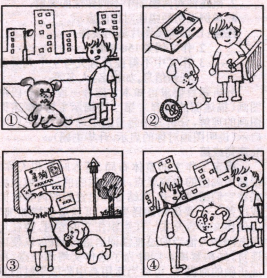题目内容
It was about ten o’ clock on a Saturday morning and I took my baby daughter Holly,aged eight months to the shops. We lived in a small 1 at the time,and although it only took me ten minutes to 2 to the local shops,I had to go through several narrow lanes(乡间小路) .I had lived in the village all my life,so I knew the road 3 .
The lanes,in the village were never 4 for heavy goods vehicles,yet truck drivers still 5 using them as a short cut to get to the main road. Over the years,people had tried hard to stop 6 from using them,but I never played a(n) 7 role in it. I just signed many petitions (请愿书) that had been drawn up by other villagers,and the government still 8 trucks to use the narrow roads. So I was always 9 when driving along the lanes,in particular one very tight bend that was almost an shape and just a little 10 than one car. If another vehicle were coming the other way,one of them would have to drive 11 for a few yards to allow 12 to pass.
As we approached the S-bend,I put my 13 gently on the brake just in case a car was coming the other way. 14 I drove round the bend,heading straight toward us was a huge red truck. The driver drove so 15 that there was no way he would ever be able to hit his brakes in time to 16 .
I was so 17 that I yelled,and suddenly I woke up. It turned out to be a(n) 18,but it was so real that it seemed to 19 me that if I don't stop trucks from using the lanes,the dream may come true one day. I think it's time for me to stand up and fight for the 20 of my fellows.
1. A. village B. town C. city D. country
2. A. drive B. walk C. run D. bike
3. A. later B. well C. instantly D. correctly
4. A. used B. repaired C. changed D. designed
5. A. complained of B. objected to C. insisted on D. ended up
6. A. shoppers B. riders C. cars D. trucks
7. A. active B. parental C. positive D. social
8. A. ordered B. allowed C. advised D. forced
9. A. considerate B. curious C. cheerful D. careful
10. A. longer B. heavier C. wider D. higher
11. A. backwards B. forwards C. away D. around
12. A. each one B. the other C. another one D. the next
13. A. leg p. arm C. foot D. hand
14. A. After B. As C. If D. Until
15. A. easily B. anxiously C. smoothly D. quickly
16. A. rest B. continue C. stop D. stay
17. A. surprised B. worried C. ashamed D. frightened
18. A. plan B. dream C. imagination D. story
19. A. promise B. teach C. remind D. persuade
20. A. happiness B. health C. power D. safety
(周围的环境)
本文是记叙文。作者做了一个梦,她梦到在狭窄的小路上,一辆大货车向她飞驰而来。
1. A.本段末的 I had lived in the village all my life 提示了本题答案。
2. A.下文中出现的driving,drove等 词提示了本题答案。
3. B.根据本空前的I had lived in tpe village all my life可推泖1.作者应该 对这个村庄非常熟悉,“十分 (well) ” 了解每条路。
4. D.根据下文内容可知,这些小路 非常狭窄,本身就不是为拉重物的 食卓“备计(designed) ”的。
5. C.根据本空后的short cut可知,卡 车司机为了走捷径,“坚持(insisted on) ”使用这些小路。
6. D.根据上下文内容,尤其是最后 一段中的 if I don't stop trucks from using the lanes可知,人们多年来一 直努力阻止“卡车(trucks) ”走小路。
7. A.根据下一旬中的I just signed many petitions that had been drawn up by other villagers 可知,作者仅仅 是在别的村民起草的请愿书上签名 而己,并未“积极(active) ”参与阻止 卡车走小路的活动。
8. B.
9. D.根据最后一段可知,政府 仍然“允许(allowed) ”卡车走小路, 所以作者在小路上总足“小心 (carefUl) ”驾驶。
10. C.根据上文中的narrow lanes,tight bend,S shape _可知,这些小
路都很窄,有一处弯道只比一辆车 “宽(wider ) ” 一 点。
11. A.
12. B。根据常识我们可知,在 狭窄的路上两辆车相向而行时,需 要一辆车向“后(backwards) ”退,it “另外一—(the other) ”通过。
13. C.开车时,放在刹车上的应该是 “脚(foot) ”。
14. B.作者拐弯的动作和大卡车迎面 而来的动作几乎同时发生,故As 符合此处语境。
15. D.
16. C.根据本句中的there was no way he would ever be able to hit his brakes in time 可知,卡车 司机开得太“快(quickly) ”了,他根 本没有办法及时踩刹车让车“停下 来(stop) ”。
17. D.眼看着卡车就要撞上自己了, 作者应该非常“害怕(frightened) ”。
18. B.本段中的the dream提示了本题答案。
19. C.作者做的这个梦太真实了,它 似乎在“提醒(remind) ”作者如果 她不阻止卡车司机使用小路的
话,这个梦境迟早有一天会成真。
20. D.卡车走小路会影响村民的“安 全(safety) ”,所以作者认为是时候 站出来为此抗争了。

